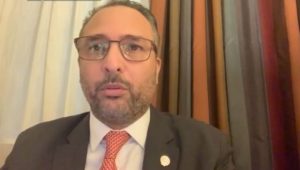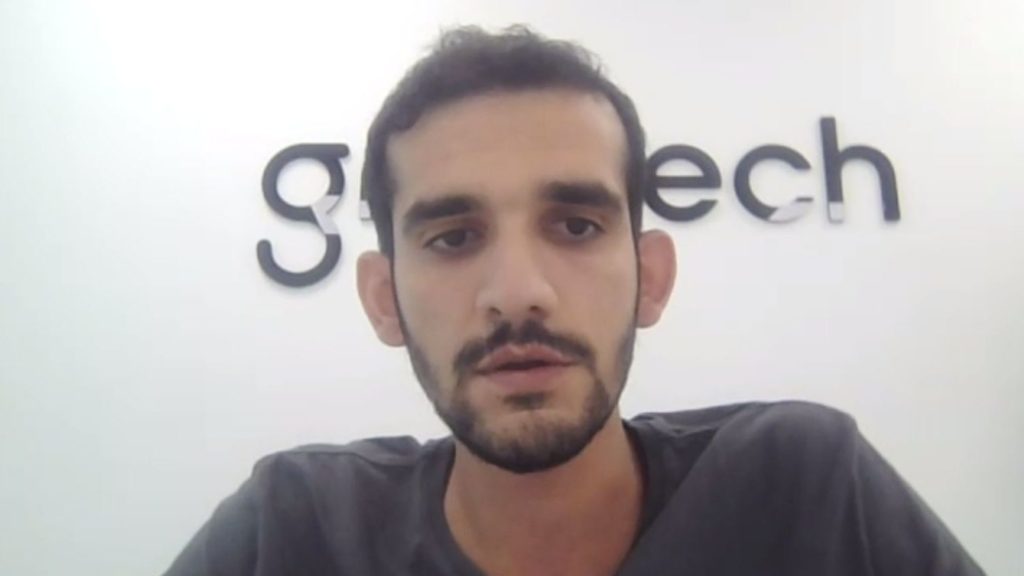São Paulo – The myriad realities in Arab countries make the region a flourishing place for different startup business models. A panorama of this market was presented to Brazilian businesses this Wednesday (3) in the webinar “Innovation Ecosystems in the Arab World.” The event launched the ABCC Lab mission, through which the Arab Brazilian Chamber of Commerce (ABCC) will take Brazilian technology startups and companies to the United Arab Emirates and Qatar from October 2 to 7. Registration is open.
“You can set up an online bank to offer microcredit or microfinance to entrepreneurs, to the population that did not have bank accounts, and also create crypto exchanges for wealthy people to operate cryptocurrencies, so it is a very diverse ecosystem,” said Jamil Diab (pictured above), a resident entrepreneur of Grubtech, illustrating possible businesses for startups in Arab countries due to the mixed population profiles. “While there are similarities, there are also differences. It is a very connected region but also fragmented, and situations vary from country to country.”
Grubtech is an Emirati startup that provides technology for food service. Diab has been working with startups for ten years, and one of his focuses is to promote entrepreneurship in emerging countries. He said he sees the partnership between Brazil and the Middle East in startups as highly strategic and exciting as both sides are emerging. “In the different positions I’ve held, I’ve realized things that work in developed markets don’t always work in emerging markets; they need to be adapted,” he said. The specialist praised Brazilian entrepreneurship, calling it a successful model.

In the webinar, there was a presentation on business incentives for foreigners in the countries to be visited by the mission. Abdulla Al-Emadi, Investor Relations Official of Invest Qatar, Qatar’s investment promotion agency, gave an overview of what the country offers in the field. He said Invest Qatar operates as a facilitator between the investor and local entities, such as licensing platforms, governmental and semi-governmental institutions, ministries, and private companies, to foster the establishment of international business in the country.
“Qatar is the hub of a 3,000-kilometer radius, which includes two billion people and a GDP of USD 6 trillion. Qatar is in a strategic position with access to the central economic regions of the world. Any country which seeks to stimulate foreign investment needs to create a business ecosystem to support it; that is what Qatar did,” said Al-Emadi. Qatar has the fourth highest GDP per capita in the world and is expected to grow by 4% this year, according to estimates.

The Associate Director of Programs at Sheraa, Abdelrazak Al Sharif, spoke on opportunities in the UAE and Sharjah, one of the country’s emirates. Sheraa is a Sharjah entrepreneurship hub. He said one of the highlights of Sharjah’s economy is the focus on small and medium-sized enterprises (SMEs) and startups. According to Al Sharif, the emirate has over 60,000 SMEs and has been receiving incentives from the federal and local governments to boost investments through startups and entrepreneurs.
Al Sharif noted Sharjah has a lower cost of living than Dubai and Abu Dhabi, excellent quality of life, and hosts many global events. He mentioned sectors with potential for investment — culture and tourism, mobility and logistics, health and well-being, agribusiness technologies, green technologies, innovation and human resources, and advanced manufacturing. Sheraa has already backed over 150 startups, which received over USD 130 million in investments, according to the director. “We help companies get started here,” he said.
Mission
In addition to an overview of what startups can find in the Arab countries, Brazilians also received information about the mission the ABCC will carry out. The institution’s head of international consulting and innovation hub, Karen Mizuta, said the mission would provide an immersion of startups and technology-based companies in two gigantic ecosystems; the UAE and Qatar, seen with enormous potential in the area.

The mission’s primary focus will be the development of an Arab innovation mindset, business opportunities, and global networking. The goals will be developing companies’ capabilities and encouraging internationalization, promoting benchmarking with trends and innovations, on-site validation of adherence to the target market and solutions proposed by the startup, understanding of the legislation and regulations for a soft landing in the sector, promoting networking for the exchange of expertise, in addition to getting to know the ecosystem through visits to technology parks, incubators, and accelerators.
The schedule will start before the trip, with preliminary activities such as an online boot camp, then head to the Gulf, continuing on the return to Brazil. In Qatar and the UAE, the program will include training, visits, talks with influential innovation players, and a Demo Day in each country, when companies can present their businesses, receive feedback, and talk to investors. The mission will end shortly before the Gitex Global technology show, to take place from October 10 to 14 in Dubai, so interested companies can also participate in the event.

The mission will be promoted by the ABCC and ABCC Lab, with the support of the institution’s technology platform, Ellos, Itaipu Technological Park (ITP), and Espaço Impulso innovation hub. Opening the event, the Marketing & Content director of the ABCC, Silvana Gomes, said the ABCC Lab was developed to foster the internationalization of innovation ecosystems in Arab and Brazilian countries, promote the exchange of experiences and knowledge between them, and stimulate networking for technology businesses. The ABCC’s Marketing manager, Marina Sarruf, was the webinar’s moderator.

At the event’s closing, the secretary-general and CEO of the ABCC, Tamer Mansour, reported innovation had been developed at the organization through the ABCC Lab for over two years. According to Mansour, the idea started during the pandemic, when the ABCC was the first in the world to adapt its activities to the virtual model through webinars. “We entered headfirst to innovate within the Arab Brazilian Chamber,” he said. The institution also developed the Ellos platform, with technological and digital possibilities for foreign trade. One of the aspects is the use of blockchain to transfer customs paperwork to a safe and streamlined digital process.
Quick facts:
ABCC Lab Mission 2022
October 2 to 7
Registration here
Translated by Elúsio Brasileiro




